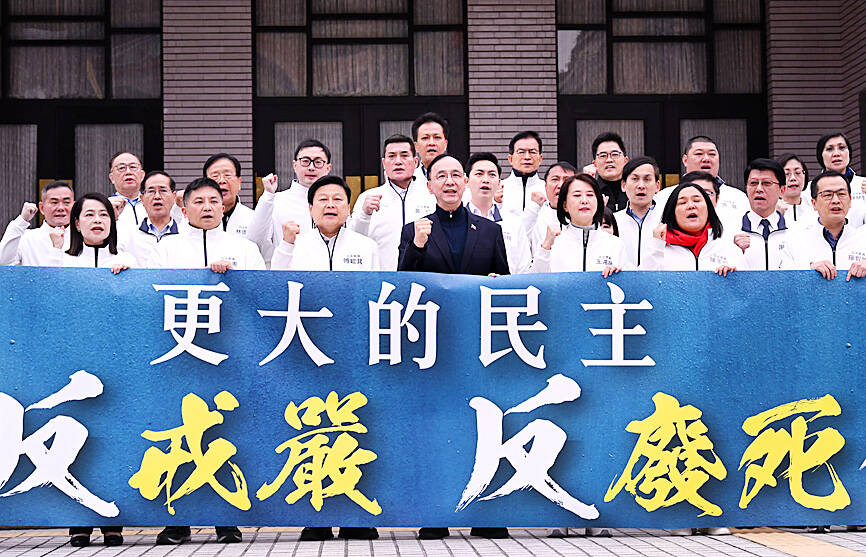Chinese Nationalist Party (KMT) Chairman Eric Chu (朱立倫) yesterday said his party would launch a campaign to hold referendums opposing the abolition of the death penalty and what he alleged was a push toward martial law and war by the ruling Democratic Progressive Party (DPP).
Chu announced the referendum campaigns at a news conference alongside KMT lawmakers in front of the Legislative Yuan, saying Taiwan’s democracy had reached a “critical moment” due to “destructive” actions by President William Lai (賴清德) and the DPP.
On the issue of the death penalty, Chu slammed a ruling issued by the Constitutional Court last year, which found the death penalty constitutional only for the “most serious” premeditated murders and crimes leading to death.

Photo: Fang Pin-chao, Taipei Times
The result of the decision has been the “substantive abolition” of the death penalty in Taiwan, Chu said, adding that this has “prevented justice from being done.”
Chu also said that because of “one person’s decision,” Taiwan has labeled China as a “foreign adversary” and pushed the sides into a dangerous situation of “quasi-war.”
Chu was referring to a speech Lai delivered last week in which he announced a range of planned measures to counter intensifying Chinese influence and infiltration campaigns against Taiwan.
The measures proposed by Lai included restoring the military court system, monitoring Taiwanese civil servants who travel to China for exchanges, and stricter reviews of travel or residency applications by Chinese citizens.
Chu compared Lai’s actions to those of a “dictator,” saying they would introduce wide-ranging restrictions on people’s thoughts, actions and freedom of speech.
He urged the public to support the campaigns, saying the referendum against the abolition of the death penalty would “return life to the people,” while the “anti-martial law, anti-war” referendum would “return rights to the people.”
The referendums would be initiated in the Legislative Yuan, as opposed to the more common route of citizens initiating them through petition drives, KMT Legislator Lo Chih-chiang (羅智強) said.
If the legislature, which the KMT controls in alliance with the Taiwan People’s Party, passes the motions, referendums could be held on Aug. 23, the next date possible under the terms of the Referendum Act (公民投票法).
The launch of the referendum campaigns comes as the KMT looks to recapture political momentum amid a campaign to initiate recall votes against more than 30 of its lawmakers.
Last week, the KMT announced that it would hold 100 “policy briefings” nationwide from Thursday to May 20, following the organization of eight similar events by the DPP.

A preclearance service to facilitate entry for people traveling to select airports in Japan would be available from Thursday next week to Feb. 25 at Taiwan Taoyuan International Airport, Taoyuan International Airport Corp (TIAC) said on Tuesday. The service was first made available to Taiwanese travelers throughout the winter vacation of 2024 and during the Lunar New Year holiday. In addition to flights to the Japanese cities of Hakodate, Asahikawa, Akita, Sendai, Niigata, Okayama, Takamatsu, Kumamoto and Kagoshima, the service would be available to travelers to Kobe and Oita. The service can be accessed by passengers of 15 flight routes operated by

Alain Robert, known as the "French Spider-Man," praised Alex Honnold as exceptionally well-prepared after the US climber completed a free solo ascent of Taipei 101 yesterday. Robert said Honnold's ascent of the 508m-tall skyscraper in just more than one-and-a-half hours without using safety ropes or equipment was a remarkable achievement. "This is my life," he said in an interview conducted in French, adding that he liked the feeling of being "on the edge of danger." The 63-year-old Frenchman climbed Taipei 101 using ropes in December 2004, taking about four hours to reach the top. On a one-to-10 scale of difficulty, Robert said Taipei 101

Taiwanese and US defense groups are collaborating to introduce deployable, semi-autonomous manufacturing systems for drones and components in a boost to the nation’s supply chain resilience. Taiwan’s G-Tech Optroelectronics Corp subsidiary GTOC and the US’ Aerkomm Inc on Friday announced an agreement with fellow US-based Firestorm Lab to adopt the latter’s xCell, a technology featuring 3D printers fitted in 6.1m container units. The systems enable aerial platforms and parts to be produced in high volumes from dispersed nodes capable of rapid redeployment, to minimize the risk of enemy strikes and to meet field requirements, they said. Firestorm chief technology officer Ian Muceus said

MORE FALL: An investigation into one of Xi’s key cronies, part of a broader ‘anti-corruption’ drive, indicates that he might have a deep distrust in the military, an expert said China’s latest military purge underscores systemic risks in its shift from collective leadership to sole rule under Chinese President Xi Jinping (習近平), and could disrupt its chain of command and military capabilities, a national security official said yesterday. If decisionmaking within the Chinese Communist Party has become “irrational” under one-man rule, the Taiwan Strait and the regional situation must be approached with extreme caution, given unforeseen risks, they added. The anonymous official made the remarks as China’s Central Military Commission Vice Chairman Zhang Youxia (張又俠) and Joint Staff Department Chief of Staff Liu Zhenli (劉振立) were reportedly being investigated for suspected “serious